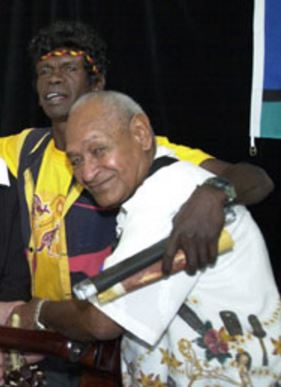George Rrurrambu Burarrwanga facts for kids
Quick facts for kids
George Rrurrambu Burarrwanga
|
|
|---|---|

Burarrwanga (left) with Seaman Dan (right) in 2002
|
|
| Background information | |
| Birth name | George Rrurrambu |
| Also known as | George Djilangya |
| Born | 1957 Elcho Island, Northern Territory, Australia |
| Origin | Papunya, Northern Territory, Australia |
| Died | 10 June 2007 (aged 49–50) Elcho Island, Northern Territory, Australia |
| Genres | Rock, Aboriginal music |
| Occupation(s) | Musician |
| Instruments | Vocals |
| Years active | 1975-2007 |
| Labels | Powderworks, Festival/Parole |
George Rrurrambu Burarrwanga (1957 – 10 June 2007) was a very important Aboriginal musician. He was best known as the lead singer of the famous Warumpi Band. This was an Aboriginal rock band.
George was a Yolngu man. He was born in 1957 in a remote homeland called Matamata. He grew up in the community of Galiwinku on Elcho Island. This island is off the coast of Arnhem Land.
Contents
Early Life and Music
George's musical journey started when he was a child. He learned about ancestral songlines from his father, Charlie Matjuwuy Burarrwanga. His father was a master of these traditional songs. He knew their history, pitch, and feeling very well.
His father became a highly respected Yolngu ceremonial singer. He was sought after across many Indigenous Australian communities. In 2004, George Rrurrambu was honored. He was inducted into the NT Hall of Fame at the NT Indigenous Music Awards 2004.
Moving to Yuendumu
In the late 1970s, George moved to the desert community of Yuendumu. There, he married Felicity Robertson. He also learned the Walpiri language and their customs. They had their first child, Glenda.
Yuendumu is close to the community of Papunya. Families from both places often visited each other. It was during one of these visits that George met two brothers. They were Sammy Butcher and Gordon Butcher. He also met Neil Murray. They were playing music together but needed a singer. George's talent was clear, and he soon became the lead singer of their band.
Warumpi Band's Impact
In 1983, the band released their first song. It was called "Jailanguru Pakarnu," which means Out of Jail. This was a very special moment. It was the first rock song ever released in an Australian Aboriginal language.
Famous Albums and Songs
The Warumpi Band went on to release three albums:
- Big Name No Blanket (1985)
- Go Bush (1988)
- Too Much Humbug (1996)
These albums included some very famous songs. Two of their most well-known songs are "Blackfella/Whitefella" and "My Island Home". "My Island Home" became even more famous. It was covered by Christine Anu in 1995.
Performing at Festivals
George Burarrwanga performed at many big music festivals. These included:
- WOMADelaide
- The Melbourne International Arts Festival
- The Adelaide Fringe Festival
He also played at important Indigenous music events. These were Stompen Ground in Broome and the Garma Festival in Gove.
Solo Career and Legacy
After the Warumpi Band broke up, George started a solo career. He performed for large crowds at the Festival of Darwin. He also appeared on national television. This was for the Yeperenye Federation Festival in Alice Springs in 2000. Later, he released his own reggae album. He toured across the Northern Territory and even went to Europe in 2002.
Promoting Understanding
Throughout his life, George worked hard to promote reconciliation. This means bringing people together. He wanted to help black and white Australians understand each other better. He believed that combining the skills of white Australia with the knowledge of Aboriginal people could lead to better results for everyone.
In his later years, George returned more to traditional Aboriginal life. He attended important funeral ceremonies with his father. His father was a Gumatj clan leader.
His Name and Passing
George Rrurrambu Burarrwanga passed away on 10 June 2007. He was 50 years old. For cultural reasons, after his death, he became known as George Burarrwanga. More recently, his original Yolngu name has started to be used again. For example, the notes for the Warumpi Band 4 Ever box set call him George Rrurrambu Burarrwanga. His music and message continue to be an important part of Australian culture.
 | Madam C. J. Walker |
 | Janet Emerson Bashen |
 | Annie Turnbo Malone |
 | Maggie L. Walker |

